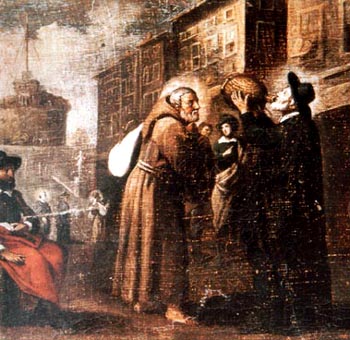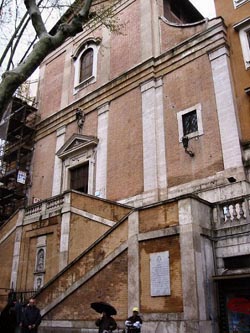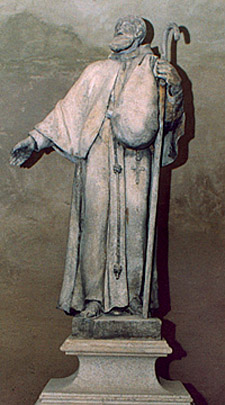The Saint of the Day
 |
 |
 |
 |
 |
 |
 |
St. Felix of Cantalice - May 18
 |
St. Felix Porri (1515-1587) was born of peasant parents at Cantalice in Apulia, the southeastern region of Italy. In his youth, he was hired out as a shepherd and farm laborer. At age 20, he became a Capuchin lay brother at nearby Città Ducale, and became known noted for his austerities and piety.
He was sent to Rome in 1547 and spent the next 38 years at the Roman friary of St. Nicholas de Portis as a questor, one who is assigned to go out to ask for provisions for the monastery. He was a friend of St. Phillip Neri and assisted St. Charles Borromeo in revising the rule for his Oblates. Felix was canonized by Pope Clement XI in 1712, the first saint of the Capuchin Minors.
Comments of Prof. Plinio:
St. Felix of Cantalice was an illiterate lay brother. He was a man who was both extremely pious and extremely picturesque, reflecting the jovial aspect of the spiritual life that used to exist in Christian Civilization, which at that time was still alive in the Italian lower classes from which St. Felix came. Alongside the great Saints who fought the tragic battles against Protestantism, Humanism and the Renaissance, we find in the bosom of the Church a St. Felix Cantalicio, an example of her medieval spirit. He expressed the joy of the Italian peasants faithful to God.
 |
So, he used to leave his minuscule cell and enter the empty church to pray and keep Our Lord company. When the Capuchin friars would arrive to pray the Divine Office, he would leave to take a nap, and then return as soon as they would leave, remaining with Our Lord before the tabernacle until the first Masses of the day would start. Then, he would sleep a little and begin his daily task as questor.
God gave him enormous graces, for which he had great joy. His reputation spread as a healer of peoples’ ills. At times, he would bless the sick with a crucifix and they would be healed. At other times, he would give away some of the foods he had collected which became a means to heal those who were afflicted. He had the mission to raise gratitude among the people for the graces and favors they received. He still lived in a world that was not saturated by the hardness of the Revolution; hence the persons he addressed would still be touched by his communicative joy.
Today, we have no idea of how innocent the medieval people were. Although the elites and the High Clergy were inundated with the Renaissance spirit, this innocence remained alive in the lower classes of the Roman people until the 16th century. Because of the nefarious action of the Revolution, we have even lost the idea of what that innocence was like.
Because of his job, St. Felix had direct contact with many people. He also had a special gift to communicate with children, who would come and surround him. In all his contacts, he always would start and end by saying Deo gratias, let us thank God. Hence his nickname became Brother Deo gratias. When the children would see him coming, they would approach and ask him to tell a story, which he always did, finishing with Deo gratias! All the children would answer aloud, Deo gratias! with that special Italian vivacity, and then return to what they had been doing. Brother Deo gratias became very famous all over the city for his virtues and miracles, as well as for his stories and communicative joy.
 |
Even though he was illiterate, he played an important intellectual role that benefited the Catholic cause. St. Charles Borromeo, justly considered one of the greatest figures of the Counter-Reformation, was Archbishop of Milan and founded an Order of Oblates. After he wrote the rules of his Order, he sent them to St. Philip Neri, who lived in Rome. As we know, St. Philip also was a great personality in the fight against Protestantism. St. Charles Borromeo asked St. Phillip his opinion about the statutes and solutions for some particular problems. After receiving them, before he even read them, St. Philip went to the monastery of St. Felix and asked his opinion on the statutes.
Brother Deo gratias could not have been more amazed. “How can you ask such a thing of me, who does not even know how to read?” was his answer to St. Philip.
“That does not matter to me. Have someone else read them to you, and then give me your opinion,” replied St. Philip Neri.
St. Felix obeyed and gave the right solutions for the problems raised by St. Charles Borromeo. His suggestions and the general revision he made were accepted and entered the statutes of the new Order. So we have the illiterate Brother Deo gratias, the humble solicitor of alms, who, notwithstanding, was wise enough to be consulted by great men such as St. Charles Borromeo and St. Philip Neri. It shows, let me say in passing, the error of those who think that books are the source of all wisdom. A simple street singer of improvised songs, a solicitor of donations, may seem insignificant, but St. Felix was a deep well of wisdom.
The life of St. Felix Cantalice shows us how joyful it is to be in the service of God. Through him, Divine Providence shows us that the service of Our Lady also includes the joys and smiles of her children.

 | |
The texts of both the biographical data and the comments come from personal notes taken by Atila S. Guimarães from 1964 to 1995. Given the fact that the source is a personal notebook, it is possible that at times the biographic notes transcribed here will not rigorously follow the original text read by Prof. Plinio. The commentaries have also been adapted and translated for TIA’s site.


